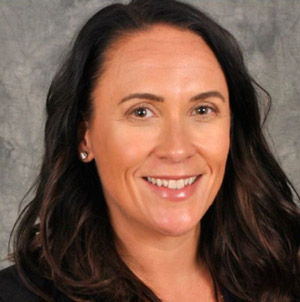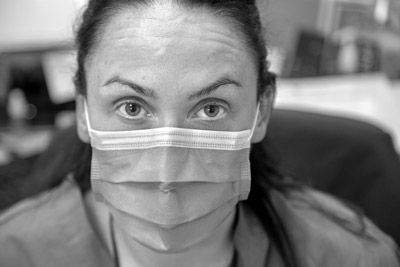Resourceful M.B.A. Student Takes Charge as a Healthcare Administrator
COVID-19 spread across the world like a biological tsunami, inundating clinics, hospitals, and medical centers. As the first wave of infections reached New Jersey, Kristen Buehler, a Berkeley College M.B.A. student with a concentration in Health Services Management and an office supervisor at Holy Name Hospital in Teaneck, NJ, was pulled into the tumult. What follows is a testament to health administrators across the country who stepped up during the early days of the pandemic.
Responding to an emergent situation

Kristen was hired by Holy Name Hospital in 2011. In 2019, she was promoted to Office Coordinator and promoted again the following year to Office Supervisor. Her pre-COVID duties included helping with payroll, office duties, and the budget. When the first COVID-19 cases were diagnosed in neighboring New York City, there was a great deal of anxiety as little information was available about this frightening virus. In response, a systemwide management reorganization took place in early March of 2019. Jason Ficks, Kristen’s supervisor, Vice President of Post-Acute Services at the time (he’s now in a similar position in Florida), was given additional responsibilities that included the newly created tele-monitoring of home care patients. Mr. Ficks’ division was to prepare tele-monitoring kits for patients that would help prevent the spread of the virus by letting patients stay in quarantine at their homes. These kits included pre-programmed iPads, COVID testing kits, digital thermometers, blood pressure monitors, masks, and other essential materials.
A large-scale operation—with no time to spare
Within the first few weeks, 500 new patients joined the home care unit, with an additional 40-50 patients joining every day after that. A hundred tele-monitoring kits were ordered every day and each had to be shipped and tracked because they were to be recycled and given to new patients. The kits would then need to be put through a sterilization process. In addition, field staff for Home Care and Hospice had to be outfitted with isolation gowns and N95 masks, which became very difficult to procure. It was a logistical nightmare and required advanced project management skills. Fortunately, Mr. Ficks had 20 years of hospital experience.
Stepping up to the challenge
On March 16, Mr. Ficks tested positive for COVID and would subsequently be out for three weeks. As the assistant to Mr. Ficks, Kristen had to step up and run the new tele-monitoring program with little or no help.
A tireless commitment to the cause
And so it began, seven days a week, 15 or more hours a day, Kristen would work with only a few hours off for sleep. Fortunately, Kristen lived nearby so she really did not have to worry about a commute which allowed her to be even more effective. A perfectionist by nature, Kristen worked feverishly to make all the working pieces come together. At a time when other hospital programs suffered from shortages, her department was well stocked and over-prepared because of her diligence. Upper management took notice and was appreciative of her efforts. By the time her supervisor returned, everything was in place, except for some tweaking.
Recognizing her heroic efforts

“Kristen was every bit the hero of the frontline health care workers,” Mr. Ficks said. “She took the initiative and quickly learned the remote monitoring system, developed a plan, executed it, and got it up and running. This likely prevented more infections by allowing patients to stay home and quarantine. At the same time, Kristen also managed the inventory for hospice and home care,” he continued, “And as if that wasn’t enough, Kristen provided tremendous emotional support to healthcare workers on the front lines. She would run out into the street to meet with them, and it was appreciated. The CEO touted the success of the entire tele-monitoring program.”
Kristen was not seeking recognition. Her motivation was entirely altruistic. “Those few weeks were the challenge of a lifetime. We were all scared, and the anxiety level of our patients was through the roof. No one truly knew what was really going on and I felt that if I could deliver a tele-monitoring kit to a patient’s home then that would help relieve the anxiety level of our healthcare workers and patients. That was my motivation to keep going,” Kristen said.
Looking ahead to further challenges
Though COVID still remains a threat to public health, Kristen has turned her attention to other concerns. “I recognized that money could be saved in our home care program at a potential savings of $125,000 a year if we stopped outsourcing. My report has been acknowledged by the Executive Director and Director of Homecare, they agreed with my idea and are considering it in the near future,” Kristen said.
Preparation helped make the difference
“The Berkeley College M.B.A. emphasizes critical thinking skills and decision making. I have learned that every decision must be quantified and responses always carefully measured after a thorough analysis,” Kristen stated. She will graduate from the Berkeley College M.B.A. program next spring and as she confidently stated, I am ready for the next challenge.”
The views and/or opinions in this article are those of the individuals interviewed. The academic achievements and/or employment outcomes described in this article are specific to each individual and are not a guarantee of similar results for past or current students. For up-to-date and detailed information, please visit BerkeleyCollege.edu and view our catalogs at BerkeleyCollege.edu/publications.

